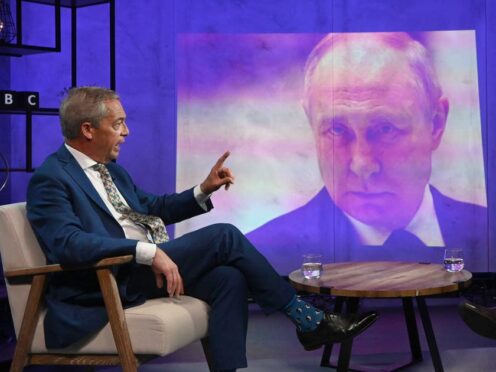
Nigel Farage has doubled down on his claims that the West provoked Vladimir Putin into invading Ukraine.
The Reform UK leader has insisted he will not apologise for his remarks during a BBC Panorama interview, and said he was not an “apologist or supporter of Putin”.
Mr Farage’s defence comes after both Sir Keir Starmer and Rishi Sunak condemned his earlier comments.

Prime Minister Mr Sunak said the Reform UK leader was “completely wrong and only plays into Putin’s hands”, and likened the comments made in the interview to appeasement of the Russian president.
Labour leader Sir Keir called the remarks “disgraceful” and said anyone standing for Parliament should make clear Russia is the aggressor in the conflict.
Mr Farage claimed “we provoked this war” in the BBC interview, while drawing a link between Nato and European Union expansion in recent decades and the conflict in eastern Europe.
Writing in the Telegraph newspaper, in an article entitled “the West’s errors in Ukraine have been catastrophic. I won’t apologise for telling the truth”, Mr Farage said the “political establishment” had been echoing a “slur” about him.
He added: “I am not and never have been an apologist or supporter of Putin. His invasion of Ukraine was immoral, outrageous and indefensible. As a champion of national sovereignty, I believe that Putin was entirely wrong to invade the sovereign nation of Ukraine.
“Nobody can fairly accuse me of being an appeaser. I have never sought to justify Putin’s invasion in any way and I’m not now.”
He added: “But that doesn’t change the fact that I saw it coming a decade ago, warned that it was coming and am one of the few political figures who has been consistently right and honest about Russia’s Ukraine war.
“What I have been saying for the past 10 years is that the West has played into Putin’s hands, giving him the excuse to do what he wanted to do anyway.”
The Reform leader, in his interview broadcast on Thursday night, drew a link between Nato and European Union expansion in recent decades and the conflict in eastern Europe.
“It was obvious to me that the ever-eastward expansion of Nato and the European Union was giving this man a reason to his Russian people to say, ‘they’re coming for us again’ and to go to war,” he told the BBC Panorama special.
Mr Farage said he had been making similar comments “since the 1990s, ever since the fall of the (Berlin) wall”, and added: “Hang on a second, we provoked this war.”
Mr Sunak said the comment was “completely wrong and only plays into Putin’s hands”.
The Prime Minister added: “This is a man (Mr Putin) who deployed nerve agent on the streets of Britain, who is doing deals with countries like North Korea, and this kind of appeasement is dangerous for Britain’s security, the security of our allies that rely on us, and only emboldens Putin further.”

Sir Keir meanwhile said: “Anyone who is standing for Parliament ought to be really clear that Russia is the aggressor, Putin bears responsibility, and that we stand with Ukraine, as we have done from the beginning of this conflict, and Parliament has spoken with one voice on this since the beginning of the conflict.”
Lib Dem leader Sir Ed Davey said he did not “share any values” with Mr Farage, while Scottish First Minister John Swinney accused the Reform leader of being a “traitor to the interests of the people on these islands”.
Conservative former defence secretary Ben Wallace had earlier in the day joked about Mr Farage’s claims to have predicted the likelihood of the war in Ukraine.
“I think Nigel Farage is a bit like that pub bore we have all met at the end of the bar who often says if ‘I was running the country’ and presents very simplistic answers to actually I am afraid in the 21st century complex problems,” Mr Wallace told BBC Radio 4’s Today Programme.
He also claimed the Reform leader need to learn to “deal with the real world” of politics.

Enjoy the convenience of having The Sunday Post delivered as a digital ePaper straight to your smartphone, tablet or computer.
Subscribe for only £5.49 a month and enjoy all the benefits of the printed paper as a digital replica.
Subscribe